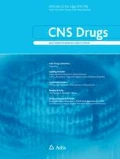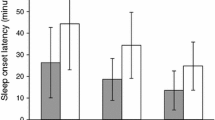Abstract
Stimulants are widely prescribed to manage attention-deficit/hyperactivity disorder (ADHD) in adults. Stimulants promote wakefulness and can produce insomnia side effects. We hypothesized that systematic studies of sleep effects would reveal patterns of sleep impairment that may be important for clinicians to monitor and manage. We conducted a review and analysis of studies that measured sleep systematically during stimulant treatment in adults. We identified nine studies that met our search criteria, including four double-blind placebo-controlled studies. All studies recorded self-report subjective sleep quality data, three studies collected actigraphy data, and three studies collected polysomnography data. One study found better subjective sleep quality under open-label treatment conditions. Both polysomnography studies found improvement in aspects of sleep patterns. Two of the actigraphy studies suggested that adults receiving stimulant treatment may have less movement during sleep, and one showed reduction in amount of sleep. Further research could inform best practices for maintaining sleep quality during stimulant treatment.

Similar content being viewed by others
References
Surman C, et al. Managing sleep in adults with ADHD: from science to pragmatic approaches. Brain Sci. 2021;11(10):1361.
American Psychiatric Association. Diagnostic and statistical manual of mental disorders. 5th ed. American Psychiatric Association; 2013.
Surman C, editor. ADHD in adults: a practical guide to evaluation and management. Springer; 2013.
Surman C, et al. Association between attention deficit/hyperactivity disorder and sleep impairment in adulthood: evidence from a large controlled study. J Clin Psychiatry. 2009;70(11):1523–9.
Philipsen A. Sleep in adults with attention-deficit/hyperactivity disorder: a controlled polysomnographic study including spectral analysis of the sleep EEG. Sleep. 2005;28(7):877–84.
Bijlenga D, et al. The role of the circadian system in the etiology and pathophysiology of ADHD: time to redefine ADHD? Atten Defic Hyperact Disord. 2019;11(1):5–19.
Snitselaar MA, et al. Sleep and circadian rhythmicity in adult ADHD and the effect of stimulants: a review of the current literature. J Atten Disord. 2017;21(1):14–26.
Adderall XRTM [package insert]. Wayne, Pennsylvania; Shire US Inc.; 2013.
Vyvanse (lisdexamfetamine dimesylate) [package insert]. Lexington, MA; Shire US Inc.; 2017.
Mydayis [package insert]. Lexington, MA; Shire US Inc.; 2017.
Weiss MD, et al. Effect of a multi-layer, extended-release methylphenidate formulation (PRC-063) on sleep in adults with ADHD: a randomized, double-blind, forced-dose, placebo-controlled trial followed by a 6-month open-label extension. CNS Drugs. 2021;35:667–79.
Adler LA, et al. Long-term safety of OROS methylphenidate in adults with attention-deficit/hyperactivity disorder: an open-label, dose-titration, 1-year study. J Clin Psychopharmacol. 2011;31(1):108–14.
Schiffer WK, et al. Therapeutic doses of amphetamine or methylphenidate differentially increase synaptic and extracellular dopamine. Synapse. 2006;15(4):243–51.
Schwartz MD, et al. The neurobiology of sleep and wakefulness. Psychiatr Clin N Am. 2015;38(4):615–44.
Jones BE. Arousal and Sleep Circuits. Neuropsychopharmacology. 2020;45:6–20.
Steriade M, et al. Brainstem control of wakefulness and sleep. New York: Plenum; 1990.
Aston-Jones G, et al. Activity of norepinephrine-containing locus coeruleus neurons in behaving rats anticipates fluctuations in the sleep-waking cycle. J Neurosci. 1981;1:876–86.
Wisor JP, et al. Dopaminergic role in stimulant-induced wakefulness. J Neurosci. 2001;21(5):1787–94.
Herrera-Solis A, et al. Dopaminergic modulation of sleep-wake states. CNS Neurol Disord Drug Targets. 2017;16(4):380–6.
Andersen ML, et al. Electrophysiological correlates of sleep disturbance induced by acute and chronic administration of D-amphetamine. Brain Res. 2009;1249:162–72.
Coogan AN, et al. Impact of adult attention deficit hyperactivity disorder and medication status on sleep/wake behavior and molecular circadian rhythms. Neuropsychopharmacology. 2019;44(1):1198–206.
Sobanski E, et al. Sleep in adults with attention deficit hyperactivity disorder (ADHD) before and during treatment with methylphenidate: A controlled polysomnographic study. Sleep. 2008;31:375–81.
Adler LA, et al. Effect of lisdexamfetamine dimesylate on sleep in adults with attention-deficit/hyperactivity disorder. Behav Brain Funct. 2009;5:34.
Kooij JJ, et al. The effect of stimulants on nocturnal motor activity and sleep quality in adults with ADHD: An open-label case-control study. J Clin Psychiatry. 2001;62:952–6.
Boonstra AM, et al. Hyperactive night and day? Actigraphy studies in adult ADHD: a baseline comparison and the effect of methylphenidate. Sleep. 2007;30:433–42.
Spencer TJ, et al. Attention-deficit/hyperactivity disorder-specific quality of life with triple-bead mixed amphetamine salts (SPD465) in adults: results of a randomized, double-blind, placebo-controlled study. J Clin Psychiatry. 2008;69:1766–75.
Surman C, et al. Impact of stimulant pharmacotherapy on sleep quality: post hoc analyses of 2 large, double-blind, randomized, placebo-controlled trials. J Clin Psychiatry. 2011;72:903–8.
Goodman DW, et al. Randomized, 6-week, placebo-controlled study of treatment for adult attention-deficit/hyperactivity disorder: individualized dosing of osmotic-release oral system (OROS) methylphenidate with a goal of symptom remission. J Clin Psychiatry. 2017;78:105–14.
Fredriksen M, et al. Impact of methylphenidate on sleep problems in adults with ADHD: a pilot polysomnography study. Nord J Psychiatry. 2021;75(3):234–8.
Kessler RC, et al. The prevalence and correlates of adult ADHD in the United States: results from the national comorbidity survey replication. Am J Psychiatry. 2006;163(4):716–23.
Lunsford Avery JR, et al. Sleep disturbances in adolescents with ADHD: a systematic review and framework for future research. Clin Psychol Rev. 2016;50:159–74.
Author information
Authors and Affiliations
Corresponding author
Ethics declarations
Funding
No sources of funding were used to assist with the preparation of this manuscript.
Conflicts of Interest
Dr. Craig Surman, MD, has received, in his lifetime, consulting fees from Eisai, McNeil, NLS Pharma, Nutricia, Pfizer, Adlon/Purdue, Rhodes, Shire, Somaxon, Sunovion, Supernus, Takeda, and Teva; payments for lectures from Alcobra, Arbor, McNeil, Janssen, Janssen-Ortho, Novartis, Shire, Reed/MGH Academy (funded by multiple companies), and GME CME (funded by multiple companies); royalties from Berkeley/Penguin for “FASTMINDS” How to Thrive if You have ADHD (or Think you Might)” and from Humana/Springer for ADHD in Adults: A Practical Guide to Evaluation and Management. Dr. Surman has also conducted clinical research at Massachusetts General Hospital supported by Abbot, Cephalon, Hilda and Preston Davis Foundation, Eli Lilly, Magceutics/Neurocentria, Jazz, Johnson & Johnson/McNeil, Lundbeck, Merck, Nordic Naturals, Shire, and Takeda. Daniel Walsh has no conflicts of interest that are directly relevant to the content of this article.
Availability of data and material
Not applicable.
Ethics approval
Not applicable.
Consent to participate
Not applicable.
Consent for publication
Not applicable.
Code availability
Not applicable.
Author contributions
CBHS: Direction of literature search and analysis of results, outline and draft of entire manuscript, editing and final revision of manuscript. DMW: Conduct of literature search, draft of methods and results sections, editing of manuscript.
Rights and permissions
About this article
Cite this article
Surman, C.B.H., Walsh, D.M. Understanding the Impact of Stimulants on Sleep in ADHD: Evidence from Systematic Assessment of Sleep in Adults. CNS Drugs 36, 253–260 (2022). https://doi.org/10.1007/s40263-022-00905-5
Accepted:
Published:
Issue Date:
DOI: https://doi.org/10.1007/s40263-022-00905-5




